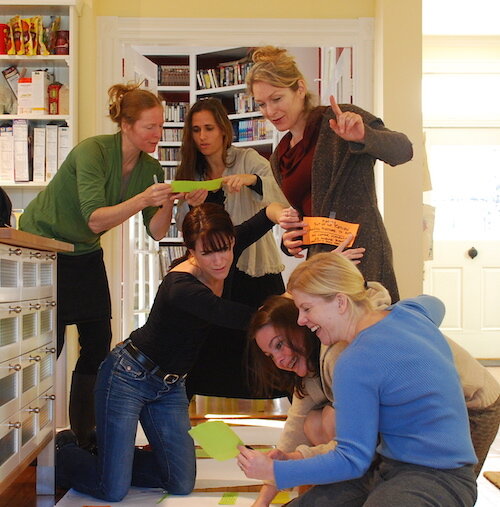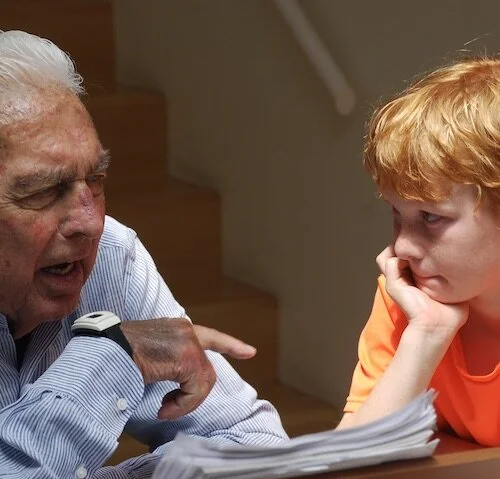
banter
Welcome to my archived blog, Banter.
I’ll start, you chime in—I really want to hear from you!
Whimsy: letting go of perfection
When I was a first-year acting student at NYU’s Tisch School for the Arts, we had a phenomenal lecture series.
The actor Kevin Kline told a story that I keep with me always. He had auditioned for every single acting program out there. And had been rejected by every one. By the time he got to his Juilliard audition, he had given up completely. Juilliard, for those of you who don’t know, is the holy grail of acting schools along with Yale School of Drama and the Royal Academy of Dramatic Art.
Mr. Kline said that he knew he had absolutely no chance of getting into Juilliard, so he went in to the audition with a sense of “whimsey.” That whimsey, that playful, buoyant, light ,and maybe even silly quality, turned out to be just what Juilliard was looking for. When Mr. Kline let go, stopped pushing, his work came alive.
This week, let go of perfection—it doesn’t work anyway. Play with whimsey!
Communication Charmers: curiosity, commitment, and contribution
This week, we consciously introduce the 3 Communication Charmers: Curiosity, Contribution, and Commitment. When we proactively get Curious, Contribute to the conversation, and Commit to being present and paying attention, we generate creativity, trust, and connection.
Give it a go and see what changes…!
Communication Catastrophes: complaint, criticism, and cutting off
This week we play with consciously avoiding Complaint, Criticism, and Cutting-off—in all interactions from team meetings to dinner conversations.
If the goal is to converse, communicate, and connect, these three Communication Catastrophes serve only to negate others, create anger and resentment, and to splinter groups.
The first thing is to become aware of our own patterns. With awareness comes change. Notice when we complain, criticize, or cut-in when someone else is speaking. Even those of us with eye-rolling teenagers can give this a go!
This week: consciously avoid complaining, criticizing, and cutting others off when they are speaking. Then, notice how our relationships shift.
Next week: we go further and substitute Communication Catastrophes with Communication Charmers!
Aliveness: play and creativity
“Play is the continuous evidence of creativity, which means aliveness.” —D.W. Winnicott
This week, I invite you to nurture your own sense of aliveness by consciously bringing play into your daily life.
Be an actor: what actors can teach us about communication, commitment, and play
In the theater, we say that “theater work is life work.” The work we do to be better actors, is the work we do to be better people. This week, we emulate actors to increase our presence, impact, connection, and sway in the world. What makes someone a good actor? Read on!
Nobody is boring: how to make every conversation fascinating
My father, Warren Bennis, used to say that if we find someone boring, it means we are not asking the right questions. My father was never bored and found everyone utterly fascinating.
Your challenge this week:
Make a conversation interesting by asking new questions.
Here’s how my father worked his magic…
Breathe…how to be present, calm, open, and connected.
The simplest, most accessible, most profound tool we have to enhance our presence, is with us every moment. Our breath.
Calming breath is used for anxiety, vocal quality, grounding, finding your authentic voice, transitions, to connect to your self, to connect with your emotions, and to connect with your audience.
This week, we breathe!
Vocal presence 2: listen deeper…
Last week, I asked you to simply listen to the voices of announcers on the radio. Just listen for the sounds of the voices.
This week, I want you to listen deeper. What can you tell about the person from their voice? Think about emotion, connection, present or reading?
Vocal presence: learn from the professionals by listening to the radio
This week, as you drive, or cook or even watch the news (you might have to close your eyes), listen to the voices of the hosts, guests, reporters, interviewers. Just listen. Notice. Next week we will do more with this.
Be a first-class noticer: becoming a great communicator begins with building awareness
Every great communicator starts with an awareness of themselves in context, in relationship, in a dance with the world around them.
This week, be a first-class noticer.
Blue Bathroom Coaching: bring out the best in others
I have a friend, Jeannie, who makes me funny. I am not a funny person, generally, but for whatever reason, I become especially hilarious when I’m with Jeannie. There are certain people I love to be around because they bring out the best in me; I see myself through their eyes and grow into that person.
I remember teaching acting at the Cleveland School for the Arts. If I could immediately identify and point out something special about each kid, they literally bloomed into that potential before my eyes.
This week, we will all practice being Jeannie, being a person who brings out the best in others. I call this “Blue Bathroom Coaching.” Try it.
Let’s begin.
Sign-up for Weekly Presence Prompts
Weekly prompts for public speaking, virtual communication, personal presence, and skillful conversations.















